In the following sections, you’ll read about the progress and advances that our community of supporters made possible during the past year. We want to extend our deepest thanks to our community for being part of the movement to transform the lives of kids across this province.
Childhood illnesses don’t stop in a pandemic
While the COVID-19 pandemic brought on significant changes within our communities, one thing remained the same: many children continued to face serious, life-long childhood illnesses that don’t stop in a pandemic.
The past year has only heightened our awareness of the critical health care needs of children facing life-altering illnesses. And it’s made one thing very clear: these illnesses are relentless. Which means we need to be even more so if we’re going to beat them.
Messages of hope & new possibilities
A word from our Foundation’s President & CEO and Board Chair
A huge thank you to our Foundation’s Board of Directors and Executive Team for their leadership and contributions this past fiscal year.
KEY HIGHLIGHTS 2020/21
This past year was one where we witnessed progress & community support in many ways. Here are a few of them.





What if the odds weren’t against me?
CANCER—Today, one in five children in British Columbia with cancer still don’t survive.
A hopeful future for kids with cancer
Every year in BC, approximately 130 children are diagnosed with cancer. Of that group, one in five will not survive. This is the equivalent of losing a classroom of children every year.
Thanks in part to research through the Michael Cuccione Childhood Cancer Research Program (MCCCRP) at BC Children’s, survival rates among kids with cancer have dramatically improved over the decades. However, 20 per cent of these children are still relapsing, not responding to conventional therapies, or succumbing to devastating side effects of the very treatments meant to save them.
But with the support of committed, compassionate and generous donors, cancer care and research are rapidly progressing in previously unimaginable ways. Here are a few examples.
PRECISION MEDICINE: THE FUTURE OF CANCER CARE
Every child’s cancer is unique, and experts at BC Children’s are at the forefront of pediatric oncology research to leverage precision medicine to identify treatments that will improve survival rates, safety and health outcomes for kids with cancer.
On the next page, take a look at several ways researchers at the MCCCRP are tackling this problem.
CAR T-CELL THERAPY
CAR (chimeric antigen receptor) T-cell therapy is a highly innovative approach to personalized medicine that can offer hope to children and youth after their hard-to-treat cancer don’t respond to any other available treatments. This is being researched at BC Children’s for the treatment of difficult-to-cure leukemia. By genetically engineering a child’s own immune cells (T cells), this therapy is reprogramming T cells to recognize and treat cancer cells.
To date, MCCCRP investigator Dr. Amanda Li and team have been able to treat five BC Children’s patients with CAR T-cell therapy, thanks to its partnership with the Seattle Children’s Hospital-led CureWorks network, and to funding by the Michael Cuccione Foundation. Importantly, we also treated our first patient at BC Children’s—and he’s thriving.
REVOLUTIONARY CELLULAR THERAPIES
Several life-threatening diseases can only be cured by bone marrow and organ transplantation. World-pioneering researchers at BC Children’s, as part of an international network, are making these transplants safer for children, with the ultimate goal of eliminating life-long immune rejection (chronic graft-versus-host disease—cGvHD). These experts have identified a specific immune cell—regulatory natural killer cells (NKregs)—and have crafted a blueprint and expanded them by over 100-fold. This first-in-world approach will provide a powerful tool to suppress rejection in therapies such as transplantation, as well as CAR T-cell therapy.
PROFYLE INITIATIVE
The aim of the Canada-wide Precision Oncology For Young People (PROFYLE) initiative—comprised of multiple collaborative groups, many led by MCCCRP investigators at BC Children’s—is to find new, targeted treatments for the kids who don’t respond to standard therapies by profiling their tumours. It will also identify the 10-15% of young people who carry cancer predisposition genes in their healthy cells. This research aims to find new therapies that will specifically target their cancers.
PROFYLE hopes to enroll 100 children during the first four years of the program and to increase access to innovative, targeted therapies, giving kids and teens with hard-to-treat cancers personalized treatment options and renewed hope.
BRAVE INITIATIVE
Most children beat cancer, and BC Children’s has the best childhood cancer survival rate in Canada. But when a child suffers a relapse, the odds of survival drastically drop.
That’s the reason for the Better Responses through Avatomic Evidence (BRAvE) initiative, which is a partnership led by four MCCCRP investigators and their teams. They are researching new treatments on tumours grown in the lab to determine their safety and effectiveness, using a leading precision preclinical testing platform. The ultimate goal? To prevent relapse from occurring, or be prepared with a treatment plan that’s already been tested in the lab before the relapse occurs.

Despite amazing advances, we still are losing one in five kids. We need to change this, and we know how. Donor support is what drives innovation. Dr. Kirk Schultz, Director, Michael Cuccione Childhood Cancer Research Program, BC Children’s Hospital
Oncology care today & beyond
In addition to life-saving research, BC Children’s has continued its quest, thanks to your support, to conquer childhood cancers by providing the best care possible throughout a child’s entire journey with cancer, including:
CHILD & YOUTH THERAPEUTIC SERVICES continues to provide care and programs to meet the emotional and psychological needs of young patients, including art, music and pet therapy at the bedside.
PATIENT FAMILY SUPPORT provided by a team that includes social workers and psychologists to offer support and coping tools to help alleviate the emotional and social effects of cancer, as well as staff to help navigate the logistical aspects of having a child in hospital for long periods.
TRAINING & EDUCATION of fellows and the next generation of childhood cancer experts.
LONG TERM FOLLOW UP to keep a pulse on the health and well-being of a patient, long after treatment ends.
Thanks to the compassion, generosity and commitment of our donors, cancer care has transformed in BC over the past three and a half decades. In particular, we’d like to recognize the significant role of the Michael Cuccione Foundation, whose leadership has made groundbreaking cancer research at BC Children’s possible. We also want to recognize the Leung Family and Donald’s Fine Foods, and guests at the 34th Annual Crystal Ball, including the Hudson Family and the Ilich Family.
What if I didn’t have to struggle in silence?
MENTAL HEALTH – Most mental health challenges among British Columbians begin by age 18
Empowering our kids’ mental health
More than 95,000 kids and youth across BC are impacted by mental health issues. Of that group, only 40 per cent receive expert help for their condition.
In addition, more children and youth are being affected by mental health challenges due to the COVID-19 pandemic. Support for these kids has never been more critical.
Thanks to donors like you, experts at BC Children’s have made great strides to ensure kids and youth receive the specialized mental health care they need. This support is crucial, as most mental health issues begin by age 18 and early intervention leads to dramatically improved long-term outcomes.
The pandemic is hitting our young people the hardest. They’ve really been suffering. This year, what we’ve seen is mindfulness offering essential skills for health care providers and our patient population.
Dr. Dzung Vo, Director of BC Children’s Hospital Centre for Mindfulness
Exploring the power of mindfulness
This past year, the Centre for Mindfulness at BC Children’s launched vital research in order to understand and better support vulnerable populations. Specifically, a study involving parents along with their newborns and toddlers, and a separate study on mindfulness among teenagers.
Thanks to your donations, experts are studying the impacts of distress on new parents, and how that affects both the caregivers and their kids’ mental well-being in the long-term. This is the start of collecting critical data that will help guide and inform family well-being support services in the future.
The Centre for Mindfulness is continuing a similar study focused on teenagers and the use of mindfulness in order to lead healthier lives. This information will be critical in understanding how we can nurture the next generation and better support their mental health and well-being.
Additionally, the Centre for Mindfulness is developing and pilot testing MARS-PC, Mindful Awareness and Resilience Skills for Parents and Caregivers, to support parents and caregivers of children and youth suffering from illness at BC Children’s Hospital.
“Bringing mindfulness to vulnerable populations using an evidence-based approach takes time, but it is really going to be a game changer in our field,” says Dr. Vo.

Resources for families and health care providers
Thank you for your ongoing support to one of the most critical areas of child health care in BC. In particular, we’d like to recognize the generosity of the The Kelty Patrick Dennehy Foundation and participants of the RBC Race for the Kids annual event—including the title sponsor RBC—for their significant contributions to mental health.
A HEALTHIER FUTURE THANKS TO YOU
Through donor support, experts at BC Children’s have also recently enhanced existing online tools and resources, through the Kelty Mental Health Resource Centre, to ensure families have the information they need to make the most informed and healthy decisions for their loved ones.
Uncovering the pandemic’s impact on kids
COVID-19 will have long-term effects throughout society in the years to come, and thanks to donor support, experts at BC Children’s have been able to study and better understand what those impacts look like today.
For example, Dr. Quynh Doan, Director of Clinical Research and her team are completing a study that shows two-thirds of screened children in BC report having mental health and social challenges during the pandemic. In a pre-pandemic study, an already staggering one-third of children and youth screened in the emergency department were reporting mental health concerns in addition to the health issues for which they were visiting the hospital.
Additionally, Dr. Evelyn Stewart, Director of Research for Child and Adolescent Psychiatry, is also investigating the impact of the pandemic on the mental health of children and youth. Early results show psychiatric disorders are two to three times higher than expected in children, teens and parents.
“Knowing what kind of resources are needed and where, geographically, is going to be very useful to plan for, and mitigate the mental health impacts of the pandemic,” says Dr. Doan.
What if diabetes wasn’t a life sentence?
DIABETES—Each year, 120 kids in BC are diagnosed with diabetes—and that number is on the rise.
Transforming diabetes care for all kids
Over the past 10 years, BC has seen a 59 per cent surge in diabetes cases. Today, 2,500 kids live with diabetes, and by 2030 that number is expected to increase by as much as 35 per cent.
This disease impacts nearly every moment in a kid’s life. They and their loved ones have to monitor their blood sugar levels daily, and endure a never-ending cycle of needle pricks and insulin injections.
To top it off, they all live in constant fear they might suffer from life-threatening complications such as heart disease or kidney damage.
“As a parent, you have to rethink everything your family does, from birthday parties, to sports, and even family meal time,” says Dr. Shazhan Amed, Head, Division of Endocrinology at BC Children’s Hospital.
Yet thanks to supporters like you, kids in BC facing a lifetime with diabetes will receive better care than ever before, and thanks to ongoing research, there’s hope for a healthier future.
“It can feel overwhelming and exhausting to live with diabetes, but with donors, we are able to elevate care for parents in some of their most difficult times,” Dr. Amed continues.
It really does take a village to raise a child with diabetes.
Dr. SHAZHAN AMED, Head, division of Endocrinolgy

The diabetes transformation project
With donor support, in particular from guests at A Night of Miracles Gala the last two years, BC Children’s Diabetes Transformation Project (DTP) has made great strides in its key initiatives to improve access to expert diabetes care across the province—namely in peer support, virtual care, education for patients and families, and a robust registry to inform critical diabetes research in BC.
Two advisory boards were assembled last year. The first is comprised of patients and families, and the second of health care providers. These boards provide guidance and feedback from critical perspectives to shape the overall direction of the DTP, ensuring it will be as effective as possible.
In addition, two peer support pilot projects have begun development. The first is intended for children and their caregivers, and the second is a peer support messaging service for caregivers.
“Caring for a child with type 1 diabetes can be incredibly isolating,” says Dr. Amed. “We hear about the burnout and exhaustion these families often face. This peer support project enables parents and caregivers of children with type 1 diabetes to connect, learn and lean on each other when they need support.”
EDUCATION—THE CORE OF DIABETES MANAGEMENT
Diabetes management is no simple feat, and patients and their caregivers need the best information available to ensure the best outcomes. This is why the team at BC Children’s is creating a virtual, interactive, multi-media education platform to provide key information that is tailored to each child’s unique situation, and is easy to understand and use no matter where they are located in the province.
“This virtual education platform will provide patients with an evidence-based, interactive and personalized journey through diabetes education starting from diagnosis through to transition to adult care,” says Dr. Amed.
Research is the key to a healthy future
Despite the difficulties of conducting research amidst a global pandemic, great strides were made this past year in research to identify new ways to prevent, treat, and ultimately cure diabetes in children through the Canucks for Kids Fund Childhood Diabetes Laboratories at BC Children’s.
Research that began thanks to donor support has led to even greater funding. Investigator Dr. Megan Levings and team were awarded $1.6 million from the Canadian Institutes of Health Research (CIHR) and Juvenile Diabetes Research Foundation (JDRF) to study how certain immune cells contribute to the loss of insulin-producing cells in type 1 diabetes, and how these cells might be engineered to slow the immune attack and regenerate new insulin-producing cells.
Another team led by investigator Dr. Francis Lynn was awarded $3 million from CIHR and JDRF to find ways to make better human insulin-producing cells from stem cells, with the goal of a new cell transplant therapy for type 1 diabetes.
“If successful, this would be utterly transformative for children with type 1 diabetes—allowing them to live healthy lives and reducing the need for painful insulin injections,” says Dr. Lynn.

Expansion of the BC-wide pediatric diabetes registry
As part of the DTP, BC Children’s last year ramped up its virtual recruitment of patients for the BC Pediatric Diabetes Registry. At the same time, the team expanded the registry to more health authorities across BC starting with the Interior and Vancouver Island Health Authorities.
The registry aims to provide a complete picture of each child’s experience which can lead to key discoveries on how to help them better manage their condition.
What if my heartbeat didn’t scare me?
HEART – Ten per cent of children with certain heart rhythm disorders are at risk of sudden and unexpected cardiac arrest.
Uncovering the hidden perils of heart disease
Today, one in every 100 children are born with heart disease. While the vast majority of these kids will survive, many of them will face serious health complications for the rest of their lives, while others won’t know they have heart disease, until the day tragedy strikes without warning.
Our work is very focused on the quality of a child’s life—to have life be as long, healthy and as vibrant as possible. [This] is the essence of what we do.
DR. SHUBHAYAN SANATANI, HEAD, DIVISION OF CARDIOLOGY
Last year, experts took significant steps forward in transforming cardiac care, thanks to donors like you.
STOPPING CARDIAC ARREST IN ITS TRACKS
Every year, hundreds of families in Canada experience the sudden death of a seemingly healthy child, who suffers from cardiac arrest without warning.
“These children can go into life-threatening heart rhythms during very ordinary activities,” says Dr. Shubhayan Sanatani, Head, Division of Cardiology. The cause is later discovered to be a heart rhythm disorder that they never knew existed.
This is exactly the type of challenge that the Cellular and Regenerative Medicine Centre being established at BC Children’s, made possible through the commitment of Mining for Miracles, is intended to address (see page 31 for more details). A first of its kind in Western Canada, the centre gives clinicians the tools to test more children at risk of sudden cardiac arrest—and it may also help provide answers for other life-altering conditions such as diabetes, cancer, and epilepsy.
By turning a child’s blood sample into beating heart cells that come to life in a petri dish, experts test therapies on those cells rather than on the child, which can determine if a child is at high risk of sudden cardiac arrest, and the best treatment for that child.

For heart, body & mind
Heart disease not only affects a child’s body—it can take a toll on their mind, too. Children face frightening procedures and complications that can be life-threatening, such as stroke or heart failure, while their parents often carry heavy emotional loads as they do everything that they can to stay strong for their child.
Generous support from The Rooks Family, who are related to the late Jan Rooks, a beloved nurse who had worked at BC Children’s Heart Centre, went towards a dedicated psychologist for the clinic, Dr. Winnie Chung. As of January 2021, Dr. Chung supported over 100 patients and their families.
“Sometimes, the medical needs of a child with a heart condition are so intense and complex that the emotional needs, although deeply felt, may not receive the attention needed,” she says. “Last year, we took an important step in helping care for the psychological needs of patients and families to support their coping and improve their quality of life.”
BC Children’s Hospital Foundation is so grateful for the generosity of Canadian Pacific, who matched all online donations during Heart Month in February, as well as donations made
during our annual broadcast on Global BC.
Most recently, funds raised have made it possible to secure essential diagnostic equipment that is already having a positive impact in the care we are able to provide.
A game-changer in surgical care
Since its launch in 2019, the 3D Technology Program at BC Children’s, the first of its kind in Western Canada, has made an enormous difference in improving care for kids requiring heart surgery. The program is generously supported by the Ian and Ken McIntosh families and Kirmac Cares for Kids.
One child who has benefitted from the program is Ayla. At just one month old, Ayla was diagnosed with multiple heart conditions, referred to as ‘holes’ in her heart. The unusual location of these ‘holes’ and related heart problems made complete corrective surgery extremely challenging.
Three days before Ayla’s final surgery, she experienced such severe difficulty breathing that she went on a ventilator for four days, while a team of cardiologists worked to save her life. Fortunately, they were able to stabilize her health.
Engineers at the BC Children’s Digital Lab printed virtual and physical 3D replicas, which turned out to be critical. The day before Ayla’s operation, the surgical team used the 3D printed model to perform a simulated procedure, which was critical to developing an effective plan to fix her heart.
It was an incredible success, and Ayla returned home just days later. Today, at 10 months old, Ayla is off all medications and full of energy.
“We are so grateful that Ayla had access to this state-of-the-art technology so the team could go into surgery knowing exactly what to do,” Ayla’s mom, Karena, said. “It helped save our daughter’s life.”
What if I didn’t have to limit myself?
ORTHOPEDICS—Hundreds of kids across the province live with orthopedic conditions or injuries that cause chronic pain and limit their movement.
A forever altered childhood
Children with traumatic injuries and life-long conditions like cerebral palsy and early-onset Scoliosis face enormous challenges that forever alter their childhood.
For example, some can’t breathe properly because of their curved spine. Others have limb conditions that make walking painful, and running nearly impossible. World-leading orthopedic experts at BC Children’s Hospital offer these kids hope. As leaders on the global stage, these specialists are known for groundbreaking research and advances in care that have had ripple effects around the globe.
But in many ways, their work has only begun. Thousands of kids in BC—and countless more beyond—still suffer from these conditions, and while treatments exist for most of them, much more needs to be done to determine which approaches will not only enable their survival, but give them every chance to thrive.
The pathway to hope
Experts here are working to determine which treatments will not only best help children today, but in their adult years as well. They must carefully weigh treatment options because the outcomes are permanent. It could mean the difference between a lifetime of physical pain and mobility challenges, or a life free of these chronic difficulties.
This is why clinical outcomes research is so vital. Our researchers are partnering with international leaders to assess the long-term results of surgical and treatment approaches in thousands of kids around the world in order to more quickly identify the best treatments with a child’s entire lifespan in mind.
“We want to do better than fixing the problem today. We want to help them for the rest of their lives. And clinical outcomes research will help us achieve that,” says Dr. Chris Reilly, Head, Department of Pediatric Orthopedics.
We are immensely grateful for donors who are making this progress possible—in particular, for the leadership and generosity of caring individuals and organizations from the Chinese-Canadian community, whose support has been instrumental in this work.

If there is a better concept in practice…we can and must learn from that.
Dr. Kishore Mulpuri, Pediatric orthopedic surgeon & lead DDH researcher
HIP HEALTH
The compassionate generosity of Peterson is making many advances in hip health possible, including the Hip Hope Network for Global Hip Health, which is bringing together an international network of experts to develop protocols for screening, diagnosis and treatment that don’t exist today. This is essential to helping many more kids worldwide with serious hip conditions who would otherwise face a lifetime of pain and limited mobility.
Peterson’s commitment to global child health also enabled hip experts here to partner with organizations in India to develop a local developmental dysplasia of the hip (DDH) care pathway that’s creating more effective screening and treatment practices—and in turn improving patient care and quality of life. These pathways are considered one of the best evidence-based patient care tools for hospitals, and will expand to China and other countries in Africa.
LIMB CONDITIONS
This past year, pediatric orthopedic surgeon Dr. Anthony Cooper and experts within his limb lengthening lab, culminated years of work in developing a first-of-its-kind health-related quality of life questionnaire for children with lower limb differences. Led by researcher Harpreet Chhina, this initiative will be the first to roll out globally to determine which limb treatments for children will give them the best health-related quality of life throughout their lives their lives.
This past year also saw progress on an international registry for limb differences, which, for the first time globally will be collecting data on a number of pediatric limb conditions, to help identify the most effective life-long treatments for kids with limb differences.
SPINE CONDITIONS
In 2012, Dr. Firoz Miyanji was the first pediatric surgeon in Canada to introduce and pioneer a cutting-edge spinal surgery technique for scoliosis called tethering—which allows for greater mobility than the traditional spinal fusion operation. This past year, his team began looking at long-term health outcomes of this novel approach within the Harms Study Group, a global initiative to determine the best spine surgical techniques for children. As part of the Harms initiative, BC Children’s is also part of global efforts to evaluate best treatments for progressive scoliosis and other spine conditions.
KNEE & SPORTS INJURIES
Drs. Lise Leveille and Chris Reilly are known for innovative surgical techniques for sports injuries that are allowing kids to get back onto the sports field much sooner than traditional treatments, which would have kept them sidelined for months or years. BC Children’s is in the process of joining an international ACL (anterior cruciate ligament) registry as part of worldwide efforts to assess the best surgical treatments for ruptured ACLs, a key knee ligament, to improve a child’s quality of life.
In addition, experts at BC Children’s have been preparing to organize a large-scale knee and sports prevention and injury program, which will serve as a central resource hub in BC to enable more young athletes to return to sports and an active lifestyle more quickly.

A Spotlight on our Donors
Nearly 90,000 donors helped to make a difference in the lives of BC’s kids this past year. Here’s a closer look at a few of them, each of whom supported BC Children’s Hospital Foundation in their own unique ways.
Beating leukemia at age two
When Traedan was born on Nov 24, 2010 his grandparents—Colin and Teresa Karpowich of Salmon Arm—instantly fell in love. Traedan was a healthy, happy little boy with a great sense of humor and a playful personality.
“We all loved him,” says Colin. “He was a little bundle of joy.”
However when Traedan was about to turn two years old, Colin and Teresa noticed the bruises.
“They were about the size of a quarter and were scattered over his shins, torso and face,” says Colin. “It seemed strange he would bruise so easily.”
After a visit with other family members who also noticed the bruising, Traedan was taken to the Salmon Arm Hospital. The attending physician took blood tests, and after consulting with experts at BC Children’s, Colin and Teresa could never have anticipated what they would hear next.
Traedan had acute lymphoblastic leukemia. And the cancer was at a critical stage.
Traedan was flown to BC Children’s in the middle of the night to start treatment immediately. Dr. Caron Strahlendorf, Division Head of Pediatric Oncology, Hematology and Bone Marrow Transplant was assigned to Traedan’s case.
“Dr. Strahlendorf put us at ease immediately,” says Colin. “She let us know that Traedan’s treatment is routine for them, and their intention was to do everything they could to cure his leukemia.”
 Two-year-old Traedan and his dad, Charles
Two-year-old Traedan and his dad, Charles
Traedan spent nine months in treatment and recovery at BC Children’s. And today, nine years later, Traedan is a happy and healthy child.
Through their experience, Colin and Teresa grew to understand just how important BC Children’s is to all kids from across the province who suffer from illnesses like Traedan’s.
“We’ve become monthly donors because we recognize how important this is to the families of BC,” says Colin. “We have world-class doctors, facilities and staff, and we’ll continue to give because it was once Traedan’s story, but today it is somebody else’s. We can give and give and give, but we can never repay what BC Children’s has given to us—a cancer-free grandson.”
Thanks to the generosity of monthly donors like the Karpowich family, experts at BC Children’s are provided a reliable stream of funds. This allows the researchers and clinicians to take bigger and bolder steps forward, knowing they’ll have the resources to make them a reality.
A race to save lives
On June 6 of this year, three-year-old Ophelia laced up alongside her dad, AJ Delisle, to participate in the province-wide RBC Race for the Kids—a momentous occasion for any child so young, but especially for one who was born with Bartter syndrome, a rare kidney-related condition.
“When Ophelia was born, our family had an incredibly tough time figuring out what our new normal was going to look like,” says AJ, community manager at RBC. Thankfully, we made it through those initial tough years with the support of BC Children’s Hospital.”
This was the second year in a row that AJ’s family joined RBC Race for the Kids, an annual event that has raised over $15 million in support of BC Children’s Hospital since its launch in 1986.
It’s also the second year in a row that the event was held virtually, due to the COVID-19 pandemic. Despite the initial disappointment of the race community not being able to come together in person, there was a silver lining: participants could join in from across the province, including AJ’s family from Vancouver Island. And the fun began weeks before the big day, with a month-long calendar of health-promoting family activities—including virtual workouts with RBC Olympians, chef-led cooking sessions and mindfulness training.
 AJ Delisle with his daughter Ophelia
AJ Delisle with his daughter Ophelia
But the icing on the cake was the June 6 celebration. Participants of what has historically been known as Vancouver’s largest family fun run were able to recreate the race day experience at home, thanks to packages mailed to them that included shoelaces, a medal, and even a finish banner to run through as they completed their route.
Following the virtual celebration, thousands of participants walked, jogged, or ran around their neighborhoods, each taking steps to support childhood cancer and mental health initiatives at the hospital.
“RBC Race for the Kids is a great opportunity for me to give back to Children’s Hospital,” AJ said. “I was inspired to participate because without the hospital, my daughter may not be alive today.”
Giving from one generation to the next
When Lisa Greczmiel’s youngest son developed strep A, she was shocked at how quickly the disease became serious.
“It developed into a blood clot on his skull along with all the complications that came with that,” says Lisa. “He had a two week stay at BC Children’s, and to this day he still talks about the wonderful staff he met.”
In particular, Lisa recalls a nurse who, when her son was having trouble ingesting large tablets of medicine, went out of her way and requested the pharmacy change the format so that they were easier for him to swallow.
“BC Children’s is an amazing facility with exceptional people who give tirelessly to help heal our future generations,” says Lisa. “What could be better than that!”
Lisa, her sister Michele, and their families are beacons of generosity and giving back to their community. To them, it was a responsibility and a joy passed down by their father, developer Gene Greczmiel.
Throughout his storied life, Gene built homes, neighbourhoods and businesses throughout the region, and in particular Richmond. Following great success in business, Gene started to give back to the community that had given him so much.
 Lisa Greczmiel & her sister Michele Cupit
Lisa Greczmiel & her sister Michele Cupit
“Our family has always felt a strong connection with health care in our community,” says Lisa. “Our father started it and then my sister and I felt that it was something we would like to continue.”
As long-time supporters of BC Children’s including in the areas of next-generation technologies, rare diseases and oncology, the Greczmiel’s impact on health care will continue to be felt by every patient who enters the hospital doors.
“There is nothing like the feeling of helping others when they truly need it and you’re able to provide that help,” says Lisa. “We have six children between my sister and I, and they are also starting to give back in ways that they can manage. Our hope is that this will always be a part of our family’s legacy for generations to come.”
Revealing the secrets of the heart
Every year, about 50,000 Canadians, including children, will die suddenly because of a cardiac arrest. And 10 per cent of children with certain heart rhythm disorders are at high risk for sudden cardiac arrest—a condition where the heart suddenly and unexpectedly stops beating and, if not treated within minutes, is fatal.
In order to improve the outcome and treatment options for these kids, Mining for Miracles, the BC mining industry’s long-standing fundraising campaign for BC Children’s, is raising $3.385 million to establish the BC Children’s Cellular and Regenerative Medicine Centre (CRMC).
The first of its kind in Western Canada, the CRMC will empower clinicians with the tools to better understand the genetic cause of heart arrythmias—and could also be beneficial for other life-altering conditions such as diabetes and cancer—in order to provide the best possible care to children in BC.
This is just one of the many cutting-edge initiatives that Mining for Miracles has supported at BC Children’s over the years.
Since 1988, Mining for Miracles has raised more than $35 million to support the construction of facilities, groundbreaking research and the acquisition of specialized medical equipment to improve the quality of health care for children in our province.
 Buddy the Miner with patients Taylin & Colton
Buddy the Miner with patients Taylin & Colton
Whether it’s through individual and corporate donations from the mining community, or through annual fundraisers, such as the Mining for Miracles Pie Throw, this committed group has been a fervent and loyal supporter of the hospital for over three decades.
“We are deeply grateful for the support of this incredibly important effort,” says Dr. Wyeth Wasserman, former Vice-President, Research at BC Children’s Hospital. “Over the next 20 years we are going to witness transformational advances in care for pediatric disorders based on cellular regeneration, thanks in part to Mining for Miracles.”
10 years of compassion in action
At the start of 2020, the Young Ambassadors Program (YAP) were preparing to host their annual SHINE Mother’s Day Tea fundraiser, benefitting BC Children’s Hospital Foundation.
But they were dealt an unexpected blow just weeks before the big day: COVID-19 forced the event’s cancellation.
Undeterred, Arthur Chan, who founded the group 10 years earlier, and his fellow YAP members quickly switched gears.
Their tenacity, community spirit and ingenuity paid off. After gaining inspiration from a virtual Lady Gaga concert, the group quickly brought together a star-studded virtual concert of their own last August, featuring well-known youth musicians from around the world, as well as Canadian dignitaries like Prime Minister Justin Trudeau. It was a rousing success, and was followed by a second concert last December. Together, both concerts raised $160,000 and marked an incredible milestone: surpassing $2 million in funds raised for BC Children’s in just a decade.
“Through the concert, we got to share with people around the world how important it is to raise funds to provide children with the best health care,” Arthur says.
As a young adult, Arthur founded the group as an act of gratitude for the extensive care he received at the age of three from BC Children’s, after his cancer diagnosis.
 Current and former members of the Young Ambassadors Program
Current and former members of the Young Ambassadors Program
Since its launch, the group has grown in size and impact, from a core group of nine to a thriving movement of more than 100 annual participants. From recycling drives to tournaments, galas, and telethons, their continuous support has been motivated by a powerful desire to give back.
If there is anything Arthur and YAP have demonstrated, it’s what the leadership of a dedicated group of compassionate young people can achieve when they work together.
“I’m very thankful to the whole team, all the parents, the alumni, everyone who’s been with us through this journey,” Arthur says. “Because without them, all this wouldn’t have been possible.”
A lifetime of transforming care
Pioneer, groundbreaker, passionate leader. Dr. J. Mavis Teasdale exemplified each of these qualities and more. Serving as the head of BC Children’s Hematology, Oncology and BMT division from 1970 to 1987, she spent her life building up the pediatric oncology unit at the hospital.
She paved the way for future generations of clinicians and researchers to better understand these diseases, thereby improving treatments, and saving the lives of kids suffering from cancer in this province.
She always made sure to look at health care as more than simply combatting the illness at hand, and this unique outlook would help her lay the foundation of pediatric oncology in British Columbia.
In the 1960s and ‘70s—when Dr. Teasdale was the sole hematologist and oncologist on staff at BC Children’s—she looked carefully at how care was given with a keen eye. She worked to create a space that not only treated the disease, but as importantly, cared for the child receiving treatment.
Her goal was to help patients in any way that she could and for staff to better understand what these children and families were truly going through. For example, Dr. Teasdale reached out to trusted peer experts to hire a full-time psychologist to research and develop a pain and anxiety program, and engaged another for a workshop to educate staff on the processes of death and dying.
 Dr. J. Mavis Teasdale
Dr. J. Mavis Teasdale
“Dr. Teasdale cared very much for what her patients were experiencing,” says Dr. David F. Smith, colleague and friend to Dr. Teasdale. “She was always thinking about her staff and patients’ well-being.”
Dr. Teasdale took steps to ensure she could continue to help the kids in BC by creating a gift in her Will. To honour her life’s work, passion and commitment, Dr. Teasdale’s Will gift has established the Dr. Joyce Mavis Teasdale Endowment for Pediatric Cancer Clinical Education. A meaningful, ongoing footprint of our remarkable pioneer, Dr. Teasdale’s caring values are carried into the future, benefitting generations to come.
“Simply put, the huge generosity of donors has allowed the new Sunny Hill to be incredible, mind-blowing, unbelievable. It is overwhelming.”
Dr. Nancy Lanphear, Senior Medical Director, Child Development and Rehabilitation at BC Children’s, couldn’t have put it any better.
Last August, the brand new, state-of-the-art Sunny Hill Health Centre—the only pediatric rehabilitation and developmental services facility of its kind in BC—opened its doors at its new home on the campus of BC Children’s.
Ushering in a new era of care, this purpose-built facility has been designed to meet the unique and specialized needs of its patients who are recovering from life-altering events such as traumatic injuries or strokes, or developmental conditions such as cerebral palsy. These children often show strength and resilience beyond their years.
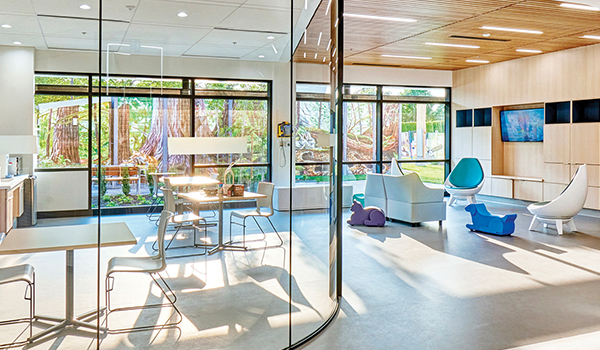
Cutting-edge advances made possible by donors like you
STATE-OF-THE-ART TECHNOLOGY
Sunny Hill’s motion lab—using the same technology found in video games—is proving invaluable to keeping kids engaged during long assessments.
“They’re working hard but it doesn’t feel like they really know it,” says Leeann Taylor, Program Manager of the Acute Rehabilitation Unit at Sunny Hill. “To have all these options to make this space as fun as we can is amazing.”
In the gym, there’s also Western Canada’s first functional electronic stimulation (FES) bike and stepper. These pieces of equipment are now allowing optimal muscle-building to take place for kids who are ready for this level of rehabilitation.
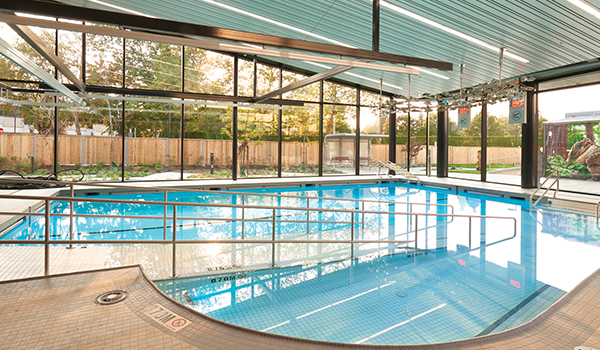
A POOL TAILORED FOR EACH CHILD
Among Sunny Hill patients, the uniquely designed pool used for aquatic therapy is a hit. Adjustable floors are being used to meet the size of each unique child, and staff have found that even if there are two kids and aquatic therapists in the pool at the same time, they can tailor the pool depth for each individual patient spaced just a few feet away from one another.
“The glass windows lining the pool deck also makes patients feel like they’re not in therapy doing laps, but rather like they are enjoying time in a fancy hotel,” says Leeann.
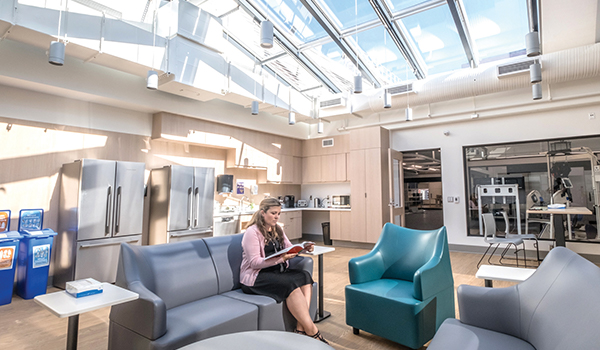
ENRICHING THE CONTINUUM OF CARE
One of the greatest benefits staff and patients alike have felt with the new facility is its location. By being on campus at BC Children’s, collaboration between all health care teams between the hospital and Sunny Hill is more efficient and streamlined than ever.
“We didn’t realize how much it would change and how fast—almost overnight,” says Leeann. “We have had so many consultants come to our unit to give care so easily. Before it was emails, calls, photos, calls with parents, arranging transportation, delays… all these things that took time and were often frustrating. Now we’re here and we see them every day.”
This has not only positively impacted the level of collaboration and care, but staff are saving days in turnaround time, allowing patients to receive care much sooner.
WORLD-CLASS CARE MADE POSSIBLE BY YOU
“Sunny Hill provides for patients a place where they can feel at home, where they can feel safe, where they can feel cared for,” says Dr. Lanphear.
And this facility was only elevated to its highest possible level because of you, our donors.
Thank you for your support and the impact it’s having on kids in BC. It is only because of supporters of Sunny Hill that together, we exceeded our goal of $14 million raised to make the best facility possible.
In particular, we want to recognize the significant generosity and visionary leadership of key supporters, including the Lalji Family, Thomas and Ann Blaauw and Family, Dr. Hilary & Patsy Hui, Djavad Mowafaghian Foundation, and Peterson, each of whom were instrumental in enhancing this new, patient-centred facility.
Rising to the COVID-19 challenge
Childhood illnesses don’t stop in a pandemic. When the COVID-19 virus spread last spring, it brought enormous challenges to kids and families already battling other devastating conditions ranging from cancer to heart disease, as well as to health care providers who were doing everything that they could to help them.
In the weeks that followed, families experienced even more stress and worry, kids already facing their darkest days were more isolated than ever, and health care providers worked tirelessly to overcome obstacles to delivering world-class care.
It was during these early days of the pandemic that the Rapid Response Fund was created—and the immediate response from donors across the province was overwhelming. British Columbians stepped forward with focused urgency, compassion and generosity, coming together to ensure that BC Children’s was supported through these challenging times.
What follows is a glimpse at what remarkable donors helped achieve over the past year.
Patient-centric care
COVID-19 has brought profound changes to our lives—but kids and families have continued to battle childhood illnesses. Over the past year, donors were there for them.
Thanks to your support, kids and families who felt more isolated and stressed than ever received gift cards, art kits, tablets to stay connected and more. Families received almost 9,000 meals so they could eat together. Twenty tablets as well as televisions and gaming systems were made available for kids in the hospital. Donors also helped purchase 100 art kits, which included supplies like canvasses, watercolour sets, crayons and pastels—so kids were able to creatively express how they felt.
“Having a tablet at the ready for patients wanting to play, create and communicate reduces barriers and provides well needed distraction and connectivity in a time where this has never been more important,” said Mary MacKillop, Director, Patient Experience.
Health care providers also benefitted from a new high capacity drying device to keep up with the increased use of protective equipment. They also greatly appreciated receiving over 1,600 food vouchers for meals in the cafeteria or small essential grocery items at the on-site pop-up grocery store.
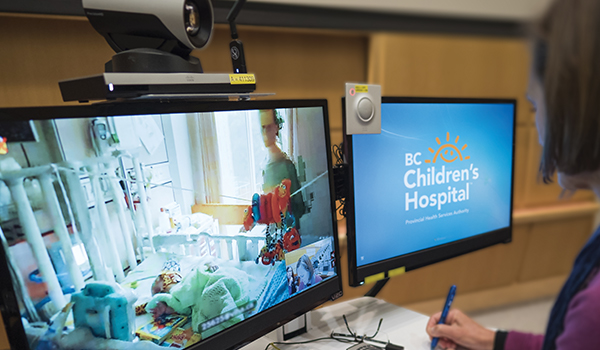
Expanding virtual telehealth
The sudden need to expand access to virtual appointments meant high-quality telehealth equipment was required to improve audio and video quality. Donors helped equip the hospital with more than 1,500 pieces of virtual health equipment to ensure health care providers could continue providing the best possible care to kids and families across the province. As a result, some hospital programs increased their virtual health offerings from five per cent to nearly 100.
Donor support also helped BC Children’s purchase a state-of-the-art infectious disease diagnostic system so that experts could get answers quickly. Since its implementation, the hospital has seen a dramatic reduction in turnaround time for infectious disease testing: from 14 hours to just three.
The mental health connection
BC Children’s Hospital has emerged as a leading research centre in BC for COVID-19-related pediatric studies. One study led by Dr. Evelyn Stewart, Director of Research for Child and Adolescent Psychiatry, to determine the impact of the pandemic on the mental health of children and youth has been partially supported by donors who gave to the Rapid Response Fund.
Other experts at BC Children’s worked quickly to launch over 67 studies to better understand COVID-19 and its effect on kids and families—such as its spread within schools and vaccine safety.
They also launched new projects to support kids and families. One BC-wide multi-disciplinary initiative—which included medical microbiologist Dr. David Goldfarb—developed a novel mouth rinse and gargle COVID-19 test, making testing easier for families and less stressful for kids.
Foundation financials
Taking on the biggest challenges facing children’s health is no small undertaking—the magnitude of the problems requires funding of equal measure.
The progress made in our work to tackle the tenacious nature of childhood illnesses is only made possible because of the transformational power of donor contributions. We are incredibly grateful to our community of supporters, who understood that childhood illnesses—and the need for world-class pediatric research and care—do not stop in a pandemic.
As a nationally accredited charity under Imagine Canada’s Standards Program, we are committed to accountability and transparency with our donors in how funds are received, invested and distributed.


INVESTMENT INCOME
BC Children’s Hospital Foundation Board of Directors, through the Finance & Investment Committee, oversee the governance of the investment assets by regularly monitoring the performance of the investment managers, selecting, appointing and releasing managers as required and selecting the appropriate amount of investment risk.
Our investment income, net of fees, was $70.5 million, compared to an investment loss of $8.4 million in the prior year. The prior year was negatively impacted due to the beginning of the pandemic. Our investment philosophy and governance allowed us to erase all of last year’s temporary losses and earn a strong gain in the current year.

Investment assets with the right asset mix are vital to ensuring stable and sustainable donor contributions to BC Children’s Hospital. Some of the larger investments made by the hospital are multi-year projects and it is critical that the funding is protected from inflation. We prudently invest donor funds through a well-diversified portfolio. A significant portion of our investment assets are endowment funds that are externally restricted contributions made by donors. On an annual basis, the Board approves the endowment payout rate (4.5%) based on the performance of our investment portfolio. These funds continue to provide an important base of ongoing and reliable funding for child health initiatives at BC Children’s Hospital.
You can view our complete set of audited financial statements at bcchf.ca/financial-statements or contact us at 604.875.2579.
What if you could transform today’s reality?
Thank you for joining our quest to save lives
Because of you, the world-class clinicians and researchers at BC Children’s are able to tackle the greatest challenges in pediatric health care. Your support fuels groundbreaking research taking place right here in BC, provides state-of-the-art equipment, and cultivates the next generation of medical leaders to improve care and enhance treatment for kids across the province.
Your unwavering support allows our experts to face today’s greatest challenges, whether it’s childhood cancers, mental health, cardiology, diabetes, or other serious, life-long illnesses.
From all of us at BC Children’s Hospital Foundation, thank you for your selfless generosity. You make yesterday’s impossibility today’s reality.
